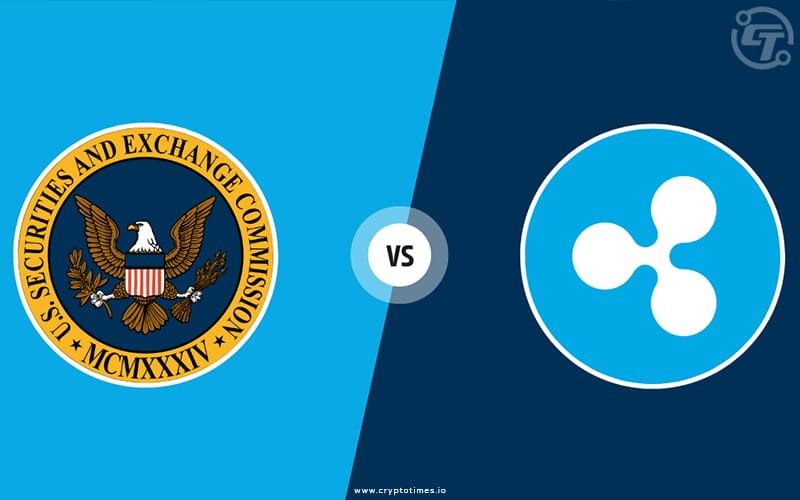In the last four years, a lot of crypto businesses have suffered regulatory scrutiny across the world and so does in the U.S. Without having a solid regulatory framework, U.S. regulators like SEC are continuously harassing crypto innovations to break speculation around them in the country. Ultimately, numerous crypto businesses have had to migrate out of the country. However, the recent judgement from the court in the SEC vs Ripple lawsuit seems to indicate that there is still hope alive.
In a significant legal battle, the prominent blockchain network Ripple defeated the notorious U.S. regulatory body SEC. SEC has a long history of harassing crypto innovations in the name of securities laws. But, Ripple’s big victory over the SEC is now clearing uncertainty around the crypto space and providing an entirely new perspective for crypto regulations.
What is SEC vs Ripple Lawsuit?
The SEC vs. Ripple is the lawsuit filed by the SEC against the creator of the blockchain network Ripple, and XRP, for selling XRP for $1.3 billion in 2013 as an unregistered security to investors. The lawsuit is filed in the United States Southern District Court of New York. SEC said that Ripple raised over $1.3 billion in 2013 by selling XRP tokens in an unregistered security offering.
However, Ripple refuted these allegations as there was no separate framework for crypto regulations was present at that time. Ripple argued that XRP should not be considered a security based on previous comments made by an SEC director.
After a more than 2 year-long battle, In September 2022, the SEC and Ripple Labs decided to skip a trial and let a judge make a decision based on the evidence they submitted to the court.
SEC vs Ripple Summary Judgment
On July 13, 2023, Judge Analisa Torres of the United States district court in the southern New York district made a judgment in favor of Ripple that states XRP is not considered a security when it is sold to the public. However, when sold to institutional investors, it will be considered as an unregistered securities offering.
A US federal judge partially supported Ripple Labs in the SEC lawsuit. The court ruled that while Ripple’s institutional sales of XRP were considered an unregistered securities offering, public sales were not securities.
Note that, the judge approved the SEC’s motion for summary judgment with regard to the institutional sale by Ripple of the XRP token, meaning XRP is a security when it’s used for institutional sales. Court has denied all other aspects.
Furthermore, she denied the SEC’s request for summary judgment as it related to programmatic sales of XRP, among other circumstances, including sales by two of the company’s former and current leaders. This means she ruled XRP is not a security when it’s sold to the broader public.
What Significance Impact SEC vs Ripple Case Holds For Crypto Community?
The SEC vs Ripple lawsuit holds immense significance for the crypto community as it may determine the future of cryptocurrency regulations and their classification, whether as securities or commodities. The case’s outcome will have far-reaching implications not only for Ripple but also for the broader crypto market. Currently, no guidelines or regulatory framework available for crypto innovations in the U.S, leads to uncertainty around its legality. This case can end this uncertainty.
Furthermore, SEC vs Ripple lawsuit will also provide clarity about compliance to operate crypto businesses in the U.S. One more thing that is clear with SEC vs Ripple verdict is that crypto sold to institutional investors will be considered as security.
This decision confirms that the ripple token is not classified as a ‘security,’ removing the requirement for it to be registered with the Securities and Exchange Commission (SEC).
Currently, in the U.S., different regulatory authorities are fighting to regulate cryptocurrency under their jurisdictions. While SEC is saying, cryptocurrency is security, Commodity Futures Trading Commission (CFTC) said that “digital assets such as bitcoin, ether, litecoin, and tether” are all commodities.
The process of the regulatory framework for crypto is under process and hence, there are no clear guidelines or compliance available for crypto businesses to operate in particular regions. Additionally, a lot of law and enforcement authorities have intensified their anti-crypto campaign, forcing businesses to move out.
Whether you like it or not, the crypto space needs some robust crypto regulation to protect users and investors. A lot of investors lost their investments through scams, hacks, or frauds. It doesn’t mean that these regulations should mean to harass users. Crypto regulations should be the protector of investors, not destroyers of crypto innovation.
Also Read: The Impact of Applying Securities Laws to Cryptocurrencies: Opportunities and Challenges
SEC vs. Ripple Lawsuit Timeline
During SEC vs Ripple lawsuit, a lot of events took place. Here are some of the key developments that occurred throughout the case.
- On 21 December 2020, the SEC filed a lawsuit against Ripple Labs for raising $1.3 billion through the sale of XRP.
- 3 March 2021, top leaders of Ripple, Larsen, and Garlinghous presented a letter to the court about an unfair notice from SEC. In response to this notice, SEC asked for an immediate hearing.
- On 14 June 2021, the court extended SEC’s deadline to disclose internal crypto trading policies. After that on 15 Oct. 2021, an expert discovery deadline was set to gather insights from experts.
In continuation to this matter, SEC got another extension till Feb 17 in sensitive document disclosure on Jan 24, 2022.
- In September 2022, the SEC and Ripple Labs agreed to bypass a trial and let a judge issue a summary judgment based on the evidence.
- On July 13, 2023, the court ruled that institutional sales of XRP were unregistered securities offerings, while programmatic sales were not. Here are some key development related to SEC vs. Ripple, on which judge ruled out.
- The court evaluated the three-pronged Howey test to assess the case.
- Howey prong 1: The court confirmed that there was a payment of money involved.
- Howey prong 2: The court found a common enterprise among institutional buyers.
- Howey prong 3: The court determined that reasonable investors expected to derive profits from Ripple’s efforts.
- The court granted the SEC’s motion regarding institutional sales but denied it in other areas.
- The court concluded that Ripple co-founder, Chris Larsen and CEO, Brad Garlinghouse did not need to be aware of any illegality for the SEC to prove violations.
- The role of the Hinman documents, internal SEC drafts, and emails was highlighted during the case, suggesting a potential conflict of interest. The true impact of the Hinman documents on the ruling remains unclear.
XRP Rose After Victory
After the resounding victory in the SEC vs Ripple lawsuit, the price of the XRP token soared by nearly 100%, skyrocketing from 0.4733 to 0.9380. Moreover, its market capitalization also surged by over $17 billion, resulting in an overall market cap of $41.5 billion.
Also Read: Binance & Coinbase Under Fire: Is the SEC Killing Crypto?
Summing Up:
SEC vs Ripple lawsuit is going to play a pivotal role in crypto businesses. Rippls’s win over SEC is the key milestone for the crypto innovations to survive the anti-crypto campaign. Also, it will help the crypto space to regain trust and ensure investors about crypto investment. It will provide strength to businesses and boost mainstream adoption.
Furthermore, this case is also important for two other ongoing legal battles in the crypto space. This year, SEC filed lawsuits against two major crypto exchanges Binance and Coinbase for selling unregistered securities. The judgment in SEC vs Ripple case will help Binance and Coinbase to navigate how they can approach legal fights.







